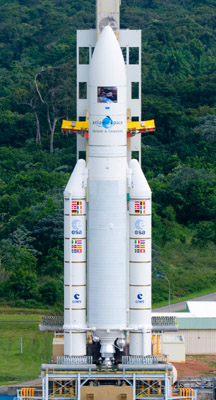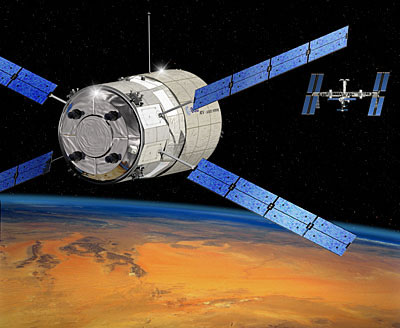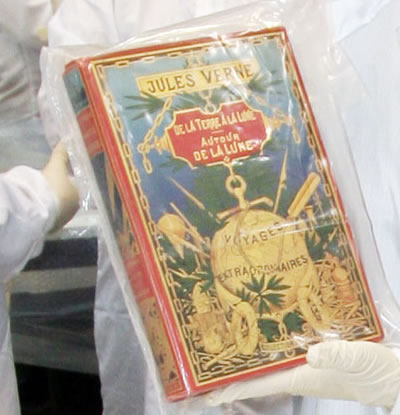Science Fiction
Dictionary
A B C D E F G H I J K L M N O P Q R S T U V W X Y Z
'Jules Verne' ATV Launch Video

Jules Verne, the European Space Agency's new Automated Transfer Vehicle, lifted off successfully today. The Ariane 5ES rocket, which was making its maiden flight, lifted off from ELA-3 at the Guiana Space Centre at 04:03:04 GMT this morning.

(Ariane-5ES rocket)
The ATV is carrying eight tons of wet and dry cargo for the International Space Station. Prior to making a rendezvous with the space station, the ATV will spend several weeks in a calibration and testing mode. It will then spend about a week catching up with the ISS and then "park" about 1200 miles away to wait until after the space shuttle Endeavour comes and goes from its own mission before attempting its own autonomous docking.
The autonomous docking process will be accomplished with the aid of two new laser sensing systems that will pinpoint the ISS for docking.

(Jules Verne ATV chasing the ISS)
The Jules Verne ATV has a few special commemorative items on board, including a copy of "De la Terre à la Lune and Autour de la Lune" published during Verne's lifetime.

(Copy of "De la Terre à la Lune and Autour de la Lune"
sent to the ISS aboard the Jules Verne ATV)
Check out this video of the launch of the Jules Verne ATV; very nice video also demonstrates how the ATV is transported to the launch pad.
(Jules Verne ATV Launch video)
The most impressive feature of the Jules Verne Automated Transfer Vehicle is that it doesn't waste any space or resources on a pilot and crew. The ATV will dock with the ISS in a completely autonomous mode. The ISS crew will have a "red button" to push if they think that the ATV is misbehaving.
I don't know who first thought of the idea of a completely autonomous take-off and docking process; here's a nice shot of the automated transfer pod from the movie Star Trek IV: The Voyage Home. It performed a picture-perfect automatic docking.

(Automated shuttle from Star Trek IV)
Read more at Europe's 'Jules Verne' Spacecraft Carries Author's Notes on Maiden Voyage and the Jule's Verne Automated Transfer Vehicle (ATV) ESA home page.
Scroll down for more stories in the same category. (Story submitted 3/9/2008)
Follow this kind of news @Technovelgy.| Email | RSS | Blog It | Stumble | del.icio.us | Digg | Reddit |
Would
you like to contribute a story tip?
It's easy:
Get the URL of the story, and the related sf author, and add
it here.
Comment/Join discussion ( 1 )
Related News Stories - (" Spacecraft ")
Europa Clipper Plate Carries A Special Message
'...a universal cryptogram — yet it is one which can be interpreted by any intelligent creature on any planet in the Solar System!' -
China Wants To Build Mega Space Ships
'Don't do anything to endanger our shipping privileges...' - Frank Herbert, 1965.
Dream Of Building Your Own Rocket?
Fiorello Bodoni, you inspire all of us.
Used Dragon Cargo Spacecraft Will Fly Again
'the overstrained meters made the smaller craft skittish as a young horse...' - Robert Heinlein
Technovelgy (that's tech-novel-gee!) is devoted to the creative science inventions and ideas of sf authors. Look for the Invention Category that interests you, the Glossary, the Invention Timeline, or see what's New.
Science Fiction
Timeline
1600-1899
1900-1939
1940's 1950's
1960's 1970's
1980's 1990's
2000's 2010's
Current News
Bone-Building Drug Evenity Approved
'Compounds devised by the biochemists for the rapid building of bone...'
Secret Kill Switch Found In Yutong Buses
'The car faltered as the external command came to brake...'
Inmotion Electric Unicycle In Combat
'It is about the size and shape of a kitchen stool, gyro-stabilized...'
Grok Scores Best In Psychological Tests
'Try to find out how he ticks...'
PaXini Supersensitive Robot Fingers
'My fingers are not that sensitive...'
Congress Considers Automatic Emergency Braking, One Hundred Years Too Late
'The greatest problem of all was the elimination of the human element of braking together with its inevitable time lag.'
The Desert Ship Sailed In Imagination
'Across the ancient sea floor a dozen tall, blue-sailed Martian sand ships floated, like blue smoke.'
The Zapata Air Scooter Would Be Great In A Science Fiction Story
'Betty's slapdash style.'
Thermostabilized Wet Meat Product (NASA Prototype)
There are no orbiting Michelin stars. Yet.
Could Crystal Batteries Generate Power For Centuries?
'Power could be compressed thus into an inch-square cube of what looked like blue-white ice'
India Ponders Always-On Smartphone Location Tracking
'It is necessary... for your own protection.'
Amazon Will Send You Heinlein's Knockdown Cabin
'It's so light that you can set it up in five minutes by yourself...'
Is It Time To Forbid Human Driving?
'Heavy penalties... were to be applied to any one found driving manually-controlled machines.'
Replace The Smartphone With A Connected Edge Node For AI Inference
'Buy a Little Dingbat... electropen, wrist watch, pocketphone, pocket radio, billfold ... all in one.'
Artificial Skin For Robots Is Coming Right Along
'... an elastic, tinted material that had all the feel and appearance of human flesh and epidermis.'
Robot Guard Dog On Duty
I might also be thinking of K-9 from Doctor Who.
